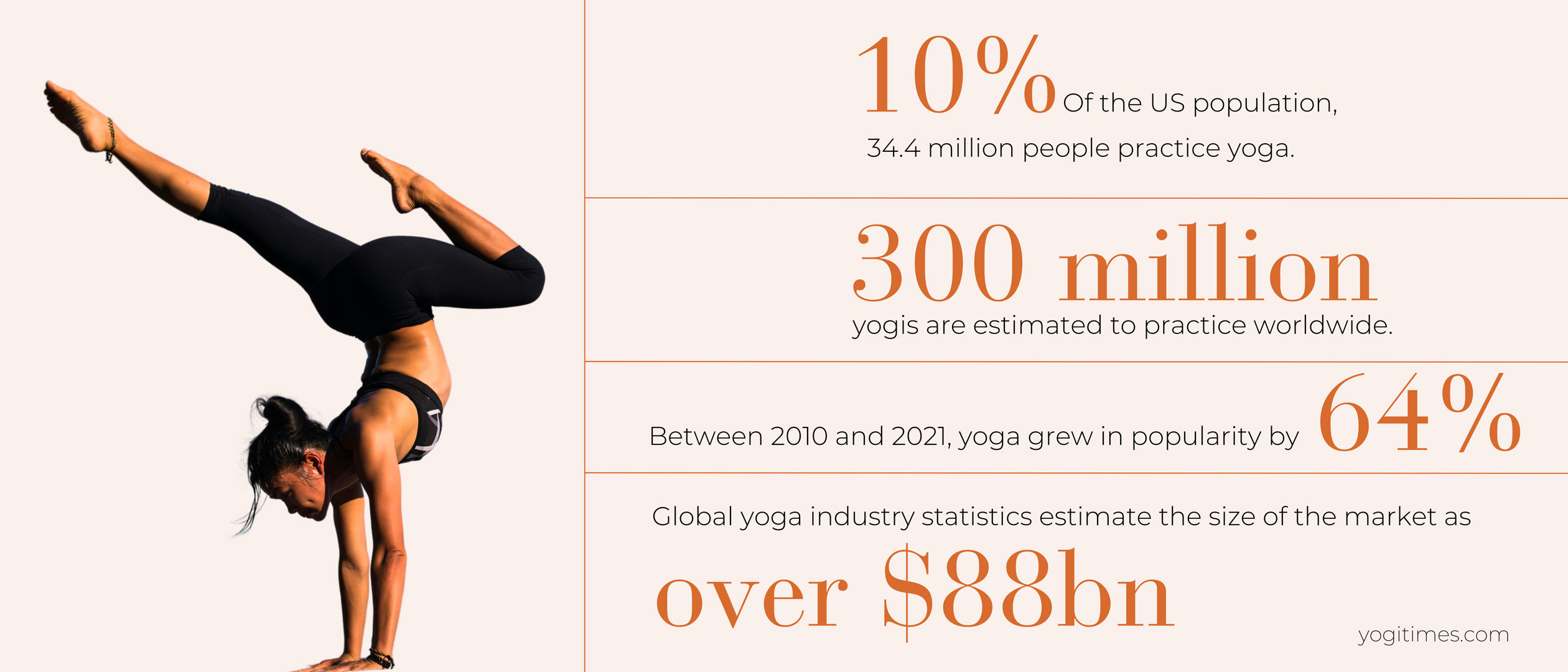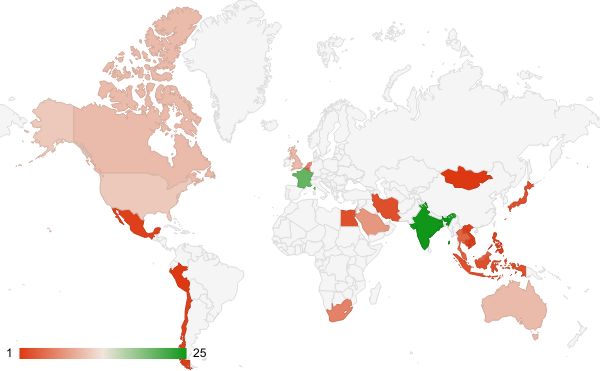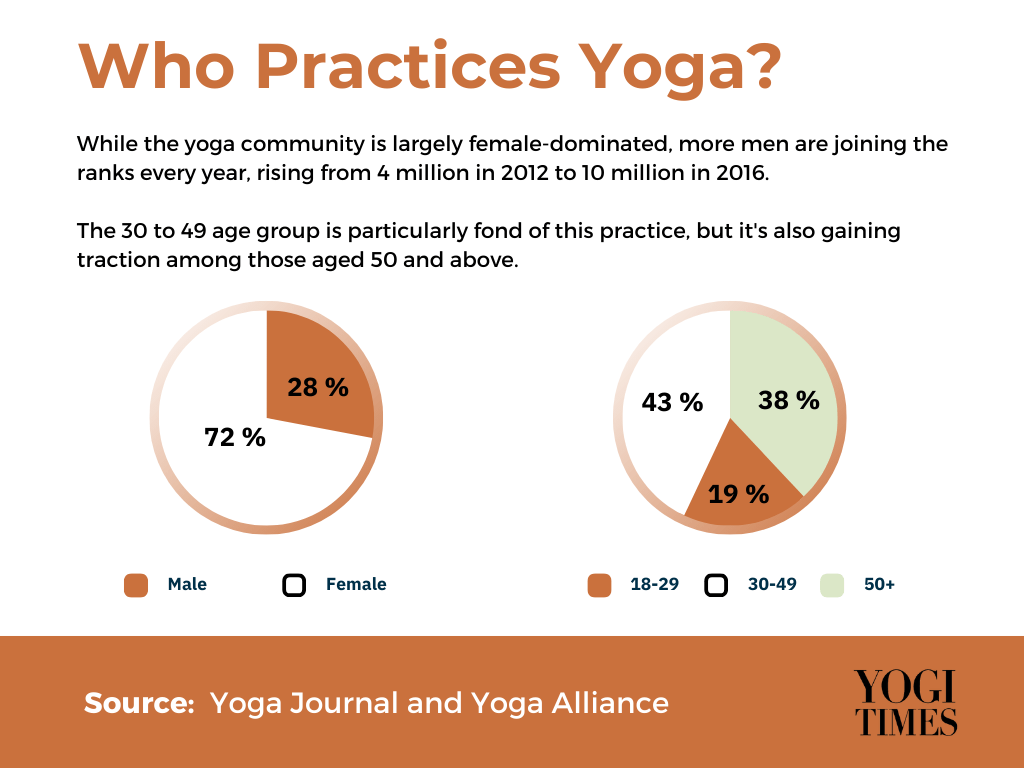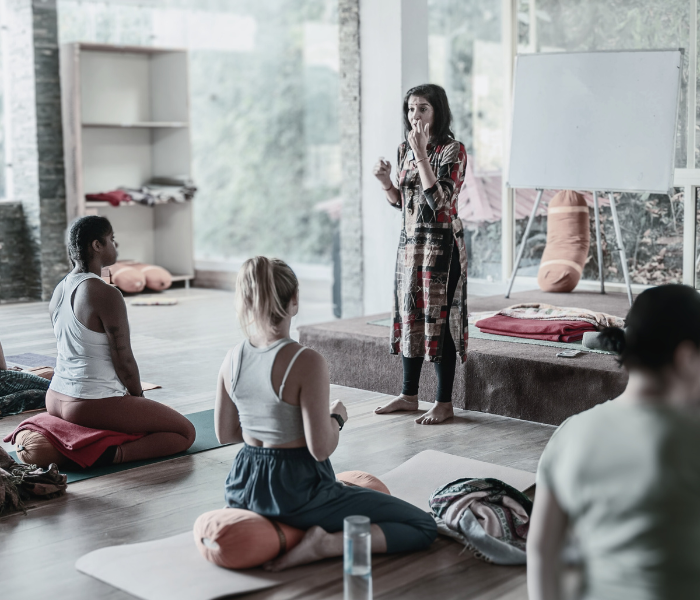Yoga statistics 2026: trends, participation, and growth

As a yoga teacher and long-time practitioner, I’ve experienced the incredible diversity of yoga firsthand. From serene outdoor flows to Zoom classes during global lockdowns, and from teaching preschoolers to guiding seniors well into their seventies—I’ve seen how yoga adapts, evolves, and reaches people of all backgrounds.
With yoga’s popularity and global reach growing every year, it’s more important than ever to understand the real numbers behind this movement. That’s why I created this article: to bring together the latest yoga statistics, demographic insights, and industry trends in one place.
We’ll explore the most up-to-date data on how many people practice yoga, who they are, where yoga is growing fastest, and how it has become both a deeply personal practice and a multibillion-dollar wellness industry.
Whether you’re a teacher, student, or simply yoga-curious, this comprehensive overview will help you see the big picture. So let’s begin:
How many people practice yoga today? What’s driving the surge? And how has yoga transformed into a cultural and commercial powerhouse across the globe?
Yoga around the world: broad statistics

Yoga may have ancient roots, but its modern reach is nothing short of incredible. Although the yoga practice was fairly contained in India before the second half of the 20th century, it has virtually exploded in the last 50-75 years.
As of 2023, over 300 million people practice yoga worldwide. That number keeps climbing, and it’s fair to assume that future datasets will show an increase in practitioners and professionals.
The global yoga industry, including classes, teacher trainings, retreats, and products, is now worth more than $88 billion USD, projected to reach over $215 billion by 2026.
In the U.S. alone, more than 34 million people practice yoga regularly, and it’s the most commonly practiced “complementary health approach”. That’s more people doing yoga than jogging.
But yoga isn’t just a Western wellness trend; it’s thriving all over the world. According to Statista, countries like India, China, Brazil, and Germany all have growing yoga populations. Women still make up the majority of practitioners globally, but in countries like India and China, the gender gap is smaller than you might expect.
So here’s something I love: yoga is crossing boundaries. You’ll find online studios streaming to remote towns, local teachers adapting the practice in new languages, and communities forming around yoga.
Yoga is everywhere. And yet every place has its own unique story.
Yoga fun facts

Yoga statistics by country
Are you ever curious about yoga stats in your country, and how it compares to other places in the world? You’re in luck! Our team worked tirelessly to compile the most comprehensive regional yoga statistics to satisfy your curiosity.

| Country/Region | Number of Practitioners | Percentage of Population | Average Age | Source |
|---|---|---|---|---|
| Worldwide Estimate | 300+ million | ~4%–5% | 30–45 years | Global Market Reports |
| France | 10.7 million | 20.5% | Not specified | SNPY |
| Italy | 6 million | 10% | Not specified | ANSA |
| Germany | 3.21 million | 3.9% | 14 and older | Statista |
| Belgium | 500,000 | 4–5% | 40 years | Market research estimates |
| United Kingdom | 2–3 million | 3–4.5% | 35–45 years | Yoga Alliance UK |
| Netherlands | 1–1.5 million | 6–8% | 35 years | Statista |
| Luxembourg | 30,000–50,000 | 5–8% | 35–40 years | Local market estimates |
| United States | 36.7 million | 11% | 38 years | Yoga Journal & Yoga Alliance (2016) |
| Canada | 3–4 million | 10% | 35–45 years | Canadian health surveys |
| Australia | 2.5–3 million | 10% | 35–45 years | Australian wellness surveys |
| Brazil | 6–8 million | 3–4% | 35 years | Yoga market reports |
| Argentina | 1–1.5 million | 2–3% | 35–40 years | Regional wellness surveys |
| Mexico | 1.3–2.6 million | 1–2% | 30–40 years | Market research studies |
| China | 10–15 million | 0.7–1% | 25–35 years | Market research reports |
| Japan | 2–3 million | 2–3% | 40 years | Japan Yoga Association |
| India | Varies widely | 20–30% (tried yoga) | Varies | Ministry of AYUSH |
| South Africa | 3–4 million | 5–7% | 30–40 years | South African wellness studies |
Can’t see your country on the list? Get in touch and share your local statistics!
India: The birthplace of Yoga
As the place of origin, India’s relationship with yoga is unique. In India, the government funds an entire Ministry of AYUSH (Ayurveda, Yoga, Unani, Siddha, and Homeopathy) to facilitate and encourage spiritual wellness practices.
The practice among the Indian population varies significantly across different demographics, including ages, genders, as well as religious and financial backgrounds. The thing that unites them though, is that a significant majority (91.5%) of Indians believe that yoga aids in the prevention and management of health conditions.
Participation Rates
Astounding but not surprising, India has the highest known percentage of practicing population. Approximately 35% of Indian adults have ever practiced yoga.
- Daily: 7%
- Weekly: 6%
- Monthly or Less: 22%
- Never: 62%
Demographic Insights
- Education: Yoga practice is more prevalent among college graduates (56%) compared to those with less education (33%).
- Age: Younger adults are more likely to practice yoga than the older population.
- Gender: Much higher participation among males compared to the rest of the world (estimated between a 50:50 and 40:60 ratio).
- Urban vs. Rural: Urban residents have a marginally higher practice rate (12.1%) than rural residents (11.9%).
- Religious affiliation: Across major religious groups in India, 61% Jains, 50% Sikhs, 38% Buddhists, 36% Hindus, 29% Muslims, and 24% Christians reported practicing yoga at least once.
Yoga Statistics in Europe
- 10.7 million people have practiced yoga in the past three years. That’s 20.5% of the population, or 1 in 5 French people.
- Yoga has grown 300% in the last decade.
- Notably, 7.9 million practice at least twice a month, and 52% do so weekly.
(Source: snpy.fr)
- 6 million people practice yoga in Italy, a 3x increase in six years (previously 2 million).
- Yoga has become a mainstream trend, with 830 yoga schools operating across the country.
- The global yoga market was valued at $106 billion in 2022, with projections reaching $180 billion by 2027.
(Source: ANSA.it)
- In 2024, around 3.21 million people in the German-speaking population aged 14 and older practiced yoga frequently in their leisure time.
- Yoga training programs are also growing in Germany, where over 30% of yoga schools now offer accredited teacher training courses.
(Sources: de.statista.com, Yoga in Europe Survey, 2020)
- Roughly 4–5% of the population (≈500,000 regular practitioners)
- Average Age: Around 40 years
(Source: wellness surveys and data from organizations such as Statista)
- Aggregated figures suggest around 2–3 million regular practitioners; some surveys note that up to 10% of adults have tried yoga at least once, with a smaller core practicing regularly.
- Average Age: Typically 35–45 years
Note: Data by individual region isn’t always reported separately.
(Source: Various reports including Yoga Alliance UK and wellness market studies)
- Approximately 1–1.5 million practitioners (roughly 6–8% participation)
- Average Age: About 35 years
(Source: Surveys and market research, e.g. Statista)
- Given its small population, roughly 30,000–50,000 regular practitioners (an estimated 5–8% participation rate)
- Average Age: Around 35–40 years
(Source: Local market estimates)
Data is sparse, but in urban centers surveys have sometimes found that 5–10% of adults have tried yoga, with regular practice being lower.
General Trend: Yoga participation rates in Europe tend to range between 3% and 10% of adults, with average ages in the mid-30s to mid-40s.
(Source: Various European wellness reports and local surveys)

North and Central America
- The well‐cited 2016 Yoga Journal & Yoga Alliance survey reported about 36.7 million practitioners (roughly 11% of the population)
- Average Age: Around 38 years (often noted as within the 35–44 range)
- 87% of yoga teachers in the US are women.
- In the US, there are now more than 50,000 yoga studios, with many of them offering yoga teacher training programs in addition to regular classes.
(Source: Yoga Journal & Yoga Alliance)
- Approximately 3–4 million practitioners (about 10% of adults)
- Average Age: Typically 35–45 years
(Source: Canadian health and fitness surveys, along with market research reports)
- Approximately 1–2% of the population (roughly 1.3–2.6 million regular practitioners)
- Average Age: Typically 30–40 years
Source: Market research studies
Yoga Statistics in South America
- Approximately 3–4% of the population practice yoga regularly (possibly 6–8 million people)
- Average Age: Around 35 years
(Source: Yoga market reports in Brazil)
- Around 2–3% of the population (roughly 1–1.5 million regular practitioners)
- Average Age: About 35–40 years
Source: Regional wellness trend surveys
- In smaller markets like Chile, figures might be on the order of 1–2% (for Chile, perhaps 200,000–400,000 practitioners), with countries such as Peru estimated at around 1% of the population.
- Average Age: Generally around 35 years
(Source: Local surveys and regional estimates)
Yoga Statistics in Asian Countries
- In urban centers, surveys suggest roughly 3–5% of adults have engaged in yoga, though regular practice is lower.
- Average Age: Often in the early to mid-30s
(Source: Local wellness surveys)
- Around 10% of adults have tried yoga, with 5–7% practicing regularly
- Average Age: About 30–40 years
(Source: Singapore fitness and wellness reports)
- Approximately 2–3 million practitioners (about 2–3% of the population)
- Average Age: Around 40 years, with a strong female predominance
(Source: Industry surveys and reports, e.g. by the Japan Yoga Association)
- Interest in yoga is growing rapidly in urban areas; some market reports suggest between 10 and 15 million regular practitioners
- Average Age: Younger urban practitioners, often averaging 25–35 years
(Source: Market research reports)
- About 10% of adults have tried yoga, with roughly 5–7% practicing regularly
- Average Age: Around 35–45 years
(Source: Hong Kong wellness surveys)
Data is scarce; estimates suggest participation rates often below 1–2%
(Source: Regional estimates)
Yoga in the Middle East
- Limited data; in urban areas, roughly 5–10% participation has been suggested
- Average Age: Around 30–40 years
(Source: Regional wellness surveys)
- Surveys indicate that 15–20% of people have tried yoga—with about 5–10% practicing regularly
- Average Age: Typically 30–40 years
(Source: Local studies and fitness market reports)
- A small but growing urban segment (perhaps 2–3% of adults) practices yoga
- Average Age: Around 30–40 years
(Source: Regional market estimates)
Yoga in Oceania
- Around 2.5–3 million practitioners (approximately 10% of the population)
- Average Age: Generally 35–45 years
(Source: Australian wellness surveys and market studies)
- Yoga is most popular in urban centers (e.g. Bali, Jakarta) with about 2–3% regular participation
- Average Age: Typically around 30–40 years
(Source: Local wellness surveys)
Yoga in African Countries
- With recent interest in wellness, urban and younger populations may see 5–10% engagement in yoga
- Average Age: Generally 25–40 years
(Source: Emerging market observations)
- Roughly 2–3% participation in major urban areas
- Average Age: Around 30–40 years
(Source: Local wellness reports)
- Data is very limited; available insights suggest participation rates likely under 5%
(Source: Regional estimations)
- Surveys suggest that around 10% of people have tried yoga with regular practice likely closer to 5–7% (potentially 3–4 million people)
- Average Age: Typically 30–40 years
(Source: South African wellness studies)
Yoga demographics and trends

Let’s dive into yoga demographics. Who are the people practicing yoga? How do age and gender demographics vary across different cultures?
Ask yourself, what type of person do you envision as a typical yoga practitioner? Do you imagine a young, flexible woman dressed in top-brand yoga clothes? Do you imagine a wise old sage draped in monk clothing?
The truth is, there is no clear cut answer. For every statistic majority, there are unique exceptions.
Historical context
Just as the practice of yoga took different shapes throughout the years, the demographics changed significantly since yoga came to the West.
Historically, yoga was an exclusionary practice among a very specific group: male ascetics, or sadhus, often renouncing worldly life to pursue spiritual liberation. For centuries, yoga was primarily a monastic, male-dominated tradition, rooted in India and passed down orally from guru to student.
That began to shift in the early 20th century, thanks to pioneering teachers like T. Krishnamacharya, often called “the father of modern yoga.” He taught some of the most influential yoga masters of our time, including his female student Indra Devi. These teachers played a huge role in globalizing yoga but even then, it was largely men teaching men.
The big gender shift happened as yoga traveled west. By the 1970s and especially into the 1990s and early 2000s, it was Western women who turned yoga into a mainstream wellness movement.
Demographic stats

- The biggest group of yoga practitioners is aged 30–49, but there’s rising popularity among teens and seniors. Adaptive yoga and chair yoga are helping older adults stay mobile and connected, while schools are beginning to incorporate breathwork and movement.
- Women make up the majority 72–80% of practitioners according to different surveys. Male participation is steadily increasing, especially in countries like India and China, where the split is closer to 60:40.
- Yoga teachers tend to reflect similar demographics. A Yoga Alliance report found that around 87% of yoga teachers in the U.S. are women aged 30–49.
- Ethnicity and accessibility are slowly improving. There’s a growing movement for inclusivity, with more teachers centering race, body diversity, trauma awareness, and neurodivergence. In the U.S., people of color now make up around 38% of yoga practitioners.
- Digital access has opened the door for many people who were unable to practice previously. Since the pandemic, online classes have soared in popularity, some studios report that over 40% of students prefer virtual classes.
Economic background
- In the U.S., 59% of yoga practitioners earn more than $75,000/year, and nearly 30% earn over $100,000, according to the 2016 Yoga in America study. That suggests yoga is still most accessible to middle- and upper-income earners.
- A 2023 market report by IBISWorld found that in the UK average drop-in classes range from £10–£20, with monthly memberships often around £80–£100. This further establishes studio classes as a luxury reserved for higher earners.
- Globally, yoga tends to be more economically diverse in places like India, where community and donation-based classes are more common, and traditional practices are integrated into daily life.
However, there’s a growing movement to change that. Many teachers and studios now offer sliding scale or donation-based classes, as well as community yoga programs for underprivileged populations.
Most practiced styles of Yoga

Yoga is not a monolith. The yoga styles and techniques range from traditional (Raja, Sivananda, Kundalini) to modern (Ashtanga, Iyengar, Yin). You also have functional yoga for managing trauma or prenatal care and novelty classes like goat yoga or nude yoga!
There is truly something for everyone! The most widely practiced styles of yoga across the globe are:
- Hatha
- Ashtanga
- Vinyasa
- Yin and Restorative
- Iyengar
- Hot Yoga
- Kundalini
Although the above statistics provide a broad picture, it is important to remember that most yogis practice more than one type of yoga.
For example, my daily practice varies between Hatha and Vinyasa Flow, but I sometimes I attend a Yin class to help me unlock deep muscle relaxation, or Aerial Yoga to defy gravity.
Yoga and fitness search stats 2005-2026
Yoga teacher training and education

Yoga education is a dynamic and growing sector, with an increasing number of people seeking to deepen their practice or pursue a career as a yoga teacher.
As yoga becomes more mainstream, the demand for qualified instructors grows, and yoga education plays a significant role in shaping the yoga community worldwide.
Global demand for Yoga teachers
The global interest in yoga teacher training has skyrocketed in recent years, thanks to both personal and professional motivations. Here are the current statistics of yoga teacher training:
- According to Yoga Alliance, there are approximately 300,000 registered yoga teachers worldwide.
- The majority of yoga teachers only complete a 200-hour YTT program, of which 30% go on to teach full-time, and 55% teach part-time.
- The global yoga teacher training market is valued at around $2.5 billion, and it’s projected to continue growing, reflecting the increasing demand for qualified instructors.
- In 2020 alone, over 12,000 yoga teacher training programs were registered in the U.S. This number has increased since online yoga teacher training became widely accessible and accredited with Yoga Alliance.
Yoga continuing education
Many yoga teachers pursue advanced certifications in specialized forms of yoga to expand their skill set and appeal to diverse audiences.
- An estimated 35% of yoga teachers complete a 500-hour YTT and 25-30% of yoga teachers pursue additional qualifications, such as prenatal yoga, yoga nidra teacher training, or breathwork coach certification.
- The yoga therapy sector is also expanding rapidly. The International Association of Yoga Therapists (IAYT) reports that there are over 2,000 yoga therapists worldwide, with a 40% increase in certifications over the last five years.
- With increasing awareness around mental health, trauma-informed yoga has become a significant area of focus. Yoga Alliance reports that 18% of yoga teachers now have additional training in trauma-sensitive approaches to teaching.
Yoga instructor salaries
The subject of money may seem somewhat taboo in the yoga world. However, I firmly believe that transparency is important for the overall community benefit. It helps us teachers advocate for ourselves and avoid burnout.
The other goal we achieve by talking about it is explaining why yoga teacher pay can be very different depending on location, experience, and the type of venue you approach. For example, instructors in New York make the most on average per year ($64,254), while those in North Carolina earn the least ($45,437), according to ZipRecruiter’s estimations.
The average base hourly rate for a yoga instructor in the United States is $30.46. Don’t be fooled! This is just a mathematical average, whereas your real hourly wage can vary.
Want to know how to make money as a certified yoga instructor? Teaching yoga is not the only way! Over 55% of yoga teachers bolster their income with digital content, educational courses, articles, retreats, and brand deals selling products and services like the Healy device.
Yoga lesson rates
- The average cost of a private yoga lesson is $70-150.
- Depending on the number of employees, corporate yoga lessons go from $75-250.
- Even after the pandemic, 40% of practitioners prefer online yoga classes due to convenience and lower costs.
- In the UK, average drop-in classes range from £10–£20, with monthly memberships often around £80–£100.
- In the US, a single group class ranges between $15-25 depending on location and class length.
Yoga online

Popularity of online Yoga teacher trainings (YTT)
The flexibility of online learning has made yoga teacher training programs more accessible than ever. Here’s how online YTTs are reshaping the yoga education landscape:
- Shift to Online Platforms: A survey conducted by Yoga Alliance in 2020 revealed that 75% of yoga teacher trainees were taking their training online. This shift was particularly accelerated during the COVID-19 pandemic, which forced many physical training programs to move online.
- Growing Online Yoga Schools: Online yoga schools have proliferated, with platforms like Yoga International, Udemy, and Gaia offering yoga courses ranging from beginner to advanced teacher training. These platforms provide an affordable and convenient way for people to pursue certification without geographical or logistical constraints.
- Increased Flexibility: 65% of prospective trainees cited the ability to train at their own pace as one of the main benefits of online teacher training courses. This flexibility allows individuals with busy schedules or those living in remote areas to access high-quality education.
Yoga preferences
At the end of the day, many yoga trends are a result of human preference. From yoga style to class duration, we all have opinions on what the best yoga class looks like.
- In a public social media poll, 67% of yoga practitioners said they prefer to practice at home. This includes online classes, yoga apps, personal practice, and private lessons.
- The same survey revealed that 43% and 38% of practitioners enjoy practicing yoga at a gym or a yoga studio, respectively.
- Surprisingly, only 32% of yogis prefer to undertake their practice outside.
Why do people practice Yoga?

Remember the first time you stepped onto a yoga mat? The mix of anticipation and curiosity, the unfamiliar yet welcoming environment, the soft hum of tranquil music in the background…
Yoga classes have become a sanctuary for many people. But before that first time, there was a why. What made you consider yoga? Here are some of the most popular reasons people choose yoga:
- Health improvement 98%
- Physical exercise 80%
- Stress management 73%
- Prenatal or postnatal care 7%
- Injury rehab and prevention 19%
- Medical condition 28%
- Flexibility and balance
- Opportunity to socialize
How often do people practice Yoga?

Yoga and health statistics
While there is limited yoga research, the medical and scientific community generally agree that regular and semi-regular yoga practice has a positive impact on a person’s wellbeing.
From chronic conditions like arthritis, to mental health disorders, the following research shows that the ancient practice of yoga is still relevant today.
- A 12-week yoga course can help people lessen ulcerative colitis symptoms.
- 87% of elderly practitioners report that yoga helps with back pain.
- One study had 64 women diagnosed with PTSD and severe anxiety practice yoga once a week. Afterward, 52% of participants no longer satisfied the criteria for PTSD.
- Practicing 90 minutes of yoga for twelve weeks will dramatically lower blood pressure.
- Yoga and meditation may be linked to lower cholesterol and even halt the progression of heart disease.
- More than 40% of yoga practitioners report feeling more inspired to eat healthier. According to the National Institutes of Health Clinical Center, yoga makes it simpler to lose weight or eat plant-based.
- A 2020 study published by the American Osteopathic Association discovered that practicing Yoga has a positive impact on people with chronic pain.
- In three months, yoga practitioners can shed an average of 3.5 kg (7.7 lbs). This data is based on moderate-level yoga classes three times a week for practitioners without underlying health issues.
Growing Yoga industry

The yoga industry extends beyond studio classes and yoga teacher training. It’s a huge industry with an estimated global value of $88 billion. Data from recent years suggests that the American yoga market is growing at a pace of 9.8% every year. By 2026, the yoga industry is predicted to be worth a staggering $215 billion.
So, what is included as part of the yoga industry?
- Yoga classes, workshops, and courses
- Yoga retreats and holiday packages
- Equipment and props (yoga mats, blocks, straps etc.)
- Yoga apparel for men and women
- Book publishing sector
- Practice enhancement (beads, singing bowls, incense etc.)
- Yoga teacher training and continuing education
- Digital content (programs, streaming services, apps)
As you can see, a yoga class at your local studio is only the tip of the iceberg! The yoga industry is still growing, at a significant rate.
The market for yoga mats is predicted to expand from $1.4 billion in 2020 to $2.6 billion by 2026. Lululemon, one of the most well-known yoga clothing brands, made $929 million in revenue between 2017 and 2018. And it increased by 18% in a single year.
Yoga spendings

The average yogi is expected to spend $62,640 in their lifetime. This money, which amounts to roughly $90 per month, is spent on lessons, accessories, and fashion trends. And while there are plenty of mindful spenders, this number indicates that some yogis invest a lot of their earnings into their practice.
- According to the yoga fashion trends of 2010, Americans spent roughly $10 billion on clothes, accessories, and classes. By 2016, that number rose to $16 billion.
- Only 8% of yoga practitioners would pay $100 for a remarkable and unique yoga experience. The average yogi would only spend approximately $40.
- Female practitioners tend to spend more on classes, apparel, and accessories than the male students. Conversely, men’s yoga pants are $6 more expensive on average. Yoga pants are one of the few items where women are exempt from paying the pink tax.
Average RPM, CPM, and ePMV for online Yoga Publications
For the sake of transparency, let us share our earning rates as one of the leading sources of educational and informational yoga content.
- The RPM (Revenue Per Thousand Impressions) for November 2025 on our MediaVine account was $12.14 (session RPM) and $10.24 (page RPM).
- Comparatively, the ePMV (Earnings Per Thousand Visitors) from Ezoic on our site was $3.50 USD (as of April 2023).
- 36.4% of our website traffic originates from the US, 4.15% from the UK, 3.97% from Canada, and 2.56% from Australia.
It’s important to note that RPM and ePMV rates can vary significantly based on factors such as the geographic location of your audience, the quality and relevance of your content, and the competition for ad placements.
Our advice: If you’re planning to start a yoga niche website, don’t rely on advertising as your primary income source. Diversifying revenue streams is crucial for sustainable growth.
Yoga hype

- Over 60 million yoga posts are trending on Instagram at any given time.
- Spotify has over 10,000 yoga playlists (because yes, vibes matter).
- Every day, thousands of images and videos are posted under #yoga hashtag.
Sources
https://financesonline.com/yoga-statistics/
https://moderngentlemen.net/yoga-statistics/
https://dealsonhealth.net/yoga-statistics/
https://moderngentlemen.net/yoga-statistics/
https://dealsonhealth.net/yoga-statistics/
https://www.yogkulam.org/blog/yoga-statistics
https://comfyliving.net/yoga-statistics/
https://www.nccih.nih.gov/health/yoga-what-you-need-to-know
Yoga infographic

Also Read>>> Morning Yoga Benefits





